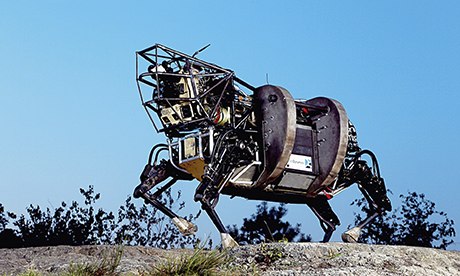
It runs at 4mph, it can toss breeze blocks, it's Boston Dynamics's Big Dog. Photograph: Boston Dynamics
You may not have noticed it, but over the past year Google has bought eight robotics companies. Its most recent acquisition is an outfit calledBoston Dynamics, which makes the nearest thing to a mechanical mule that you are ever likely to see. It's called Big Dog and it walks, runs, climbs and carries heavy loads. It's the size of a large dog or small mule – about 3ft long, 2ft 6in tall, weighs 240lbs, has four legs that are articulated like an animal's, runs at 4mph, climbs slopes up to 35 degrees, walks across rubble, climbs muddy hiking trails, walks in snow and water, carries a 340lb load, can toss breeze blocks and can recover its balance when walking on ice after absorbing a hefty sideways kick.You don't believe me? Well, just head over to YouTube and search for "Boston Dynamics". There, you will find not only a fascinating video of Big Dog in action, but also confirmation that its maker has a menagerie of mechanical beasts, some of them humanoid in form, others resembling predatory animals. And you will not be surprised to learn that most have been developed on military contracts, including some issued by Darpa, the Defence Advanced Research Projects Agency, the outfit that originally funded the development of the internet.Should we be concerned about this? Yes, but not in the way you might first think. The notion that Google is assembling a droid army that will one day give it a Star Wars capability seems implausible (even if we make allowances for the fact that its mobile software is called android). No; what makes the robotics acquisitions interesting is what they reveal about the scale of Google's ambitions. For this is a company whose like we have not seen before.Google is run by two youngish men, Larry Page and Sergey Brin, who are, in a literal sense, visionaries. Google's shareholding structure gives them untrammelled power: while other companies have to fret about the opinion of Wall Street, quarterly results etc, the Google boys can do as they please. Where most public companies – and all governments – have nowadays little desire for risk, they appear to have an insatiable appetite for it. One reason for this is that Google's dominance of search and online advertising provides a continuous flow of unimaginable revenues. The company exercises a gravitational pull on the most talented intellects in their field – software. Since software is pure thought-stuff, collective IQ is all that matters in this business. And Google has it in spades.What drives the Google founders is an acute understanding of the possibilities that long-term developments in information technology have deposited in mankind's lap. Computing power has been doubling every 18 months since 1956. Bandwidth has been tripling and electronic storage capacity has been quadrupling every year. Put those trends together and the only reasonable inference is that our assumptions about what networked machines can and cannot do need urgently to be updated.Most of us, however, have failed to do that and have, instead, clung wistfully to old certainties about the unique capabilities (and therefore superiority) of humans. Thus we assumed that the task of safely driving a car in crowded urban conditions would be, for the foreseeable future, a task that only we could do. Similarly, we imagined that real-time translation between two languages would remain the exclusive preserve of humans. And so on.What makes the Google boys so distinctive is not the fact that they didupdate their assumptions about what machines can and cannot do (because many people in the field were aware of what was becoming possible) but that they possessed the limitless resources needed to explore and harness those new possibilities. Hence the self-driving car, MOOCs, the Google books project, the free gigabit connectivity project, the X labs and so on…And these are just for starters. A few months ago, an astute technology commentator, Jason Calcanis, set out what he saw as Google's to-do list. Here's what he came up with: free gigabit internet access for everyone for life; mastering Big Data, machine learning and quantum computing; dominating wearable – and implantable – computing; becoming a huge venture capitalist and developing new kinds of currency (a la Bitcoin); becoming the world's biggest media company; revolutionising healthcare and technologies for life extension; alternative energy technologies; and transforming transportation.If any other company had a to-do list such as this we would have its executives sectioned under the Mental Health Act. And it's possible, I suppose, that the Google founders are indeed nuts. But I wouldn't bet on it, which is why we ought to be concerned. Because if even a fraction of the company's ambitions eventually come to fruition, Google will become one of the most powerful corporations on Earth. And we know what Lord Acton would have said about that.
No comments:
Post a Comment